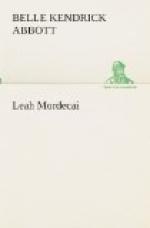“My dear,” said Mrs. Abrams, as Mark on this evening was preparing to leave his house for that of his affianced, to make the last necessary arrangements for the coming ceremony, “I wish you could be with me to-night. A mother’s heart calls for the last evening of her son’s free life, claims the last moments of the time when she can call him exclusively her own. To-morrow, dear boy, you are no longer mine. I shall have only a secondary claim upon your love and companionship, and must in the future console myself with the knowledge, that in losing a mother my son has gained a wife.”
“O mother,” replied Mark, with a troubled look, “don’t speak so. I am compelled to be at Mr. Mordecai’s a little while to night, and also to call at Crispin’s, and see that my boot is stretched, and then I’ll hasten back. Tight boots on a wedding day, mother, will not do at all, you know,” added Mark playfully, as he stroked the soft hair that waved back from the oval Jewish face-a pale, gentle face it was. “I’ll be back very soon.”
“Brother Mark, isn’t you glad my arm is so well? Mother says I may go to the synagogue, too, to-morrow, and see you married,” said the innocent little sister, whose lacerated arm still hung in the snowy bandage around her neck.
“Yes, dovey, indeed I am,” replied Mark, bending down beside the fair child, and tenderly caressing her. “If my little Rachel could not be there, brother Mark would not consider himself well married. I am only sorry that I haven’t had a peep at that vicious dog that hurt my darling so. Never mind, I am still ready and waiting for his reappearance, and then I’ll have revenge.—Good-night, dear mother, I must go; a sweet good-night to you and little Rachel-till I come back.” The young man stepped out into the cold, dark night, and turned his face toward the elegant home of the Jewish banker.
“Umph! umph! dis is a hard night for old Peter-cold wind, and no stars. People ought to ’preciate de old carrier,” grunted out rather than spoke, a rather short, slightly bent old negro, as he stood peering curiously out of the window of the dimly lighted, misty old printing-office of the “Queen City Courier.” Then turning around he shuffled toward the door, ejaculating, “Bad night on my rheumatiz;” and continuing, as he descended the well-worn stairs, “de boss just give me a little of de w’iskey bitters-w’iskey bitters mighty good for de rheumatiz. Maybe when dey warm me up good, I won’t feel so stiff, and de cold won’t pinch so dreadful. Umph! umph! umph! ward number two comes fust,” and clutching the bundle of papers more tightly, and gathering again the folds of the well-worn gray blanket around him, the old carrier struck out, as briskly as the cold and his stiffened limbs would allow, on his accustomed beat.




